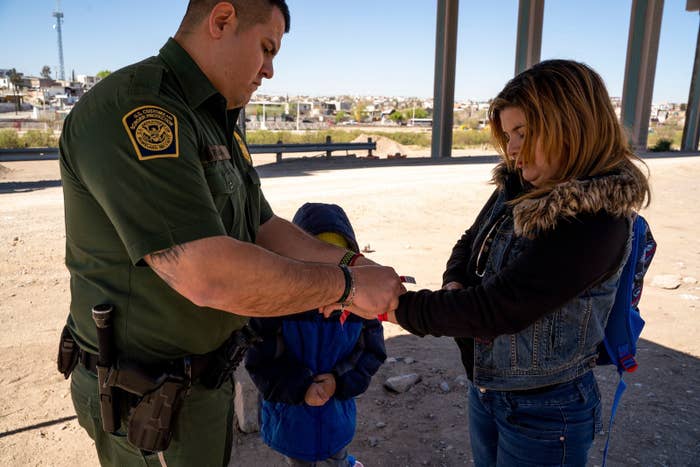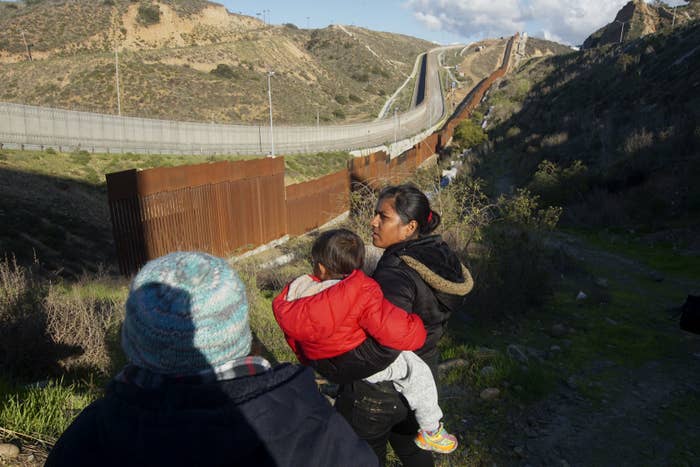
The Department of Homeland Security is expected to launch a DNA testing pilot program at the southern border next week to identify and prosecute immigrants posing as families, an agency official with knowledge of the program told BuzzFeed News.
The pilot program, which was first reported by CNN, will be rolled out for two to three days at two border locations. US Customs and Border Protection will refer adults they find posing as families to ICE’s Homeland Security Investigations (HSI) for possible prosecution.
The rapid DNA test involves a cheek swab with results available, on average, in about 90 minutes. The information gleamed from the tests will not be stored by DHS or any other federal agency, said the official.
The testing comes as US immigration authorities grapple with an unprecedented number of families and children arriving at the US–Mexico border, overwhelming facilities that were built to hold single adults from Mexico. In March, more than 53,000 families were apprehended the highest number recorded in a single month since CBP started tracking the figure in 2012.
During a recent trip to the Texas border Acting DHS Secretary Kevin McAleenan said migrants are incentivized to come as families because the US has to release children, including those accompanied by parents, from immigration detention within 20 days as part of a court settlement agreement.
"It's very clear that the cartels and smugglers know the weaknesses in our laws," McAleenan said. "They know that family units and unaccompanied children will be released with no consequences for their illegal entry."

DHS officials said the DNA testing will be voluntary and people will be asked to sign a consent form in their native language as part of the pilot program. The DNA results collected as part of the two to three-day pilot program will not be stored or used should they refer people for criminal prosecution.
Calling it "unprecedented," DHS officials said the testing was an additional tool to help direct an investigation into fraudulent family claims.
"This is going to be done on a case-by-case basis," an agency official told reporters. "Every case is unique and we're taking a look at all circumstances surrounding the situation in order to make a determination on whether we are going to pursue prosecution or not."
Since April 18, HSI officers involved in the pilot interviewed 101 parents with children they suspected were lying about being related. The investigators found that 29 families had allegedly lied, resulting in 45 people being referred for prosecution and 33 accepted by prosecutors.
The government is contracting with Ande, a company that specializes in rapid DNA testing. While the pilot program is being rolled out by HSI, a DHS official said it could be expanded and noted that Customs and Border Protection is considering DNA testing.
Vera Eidelman, staff attorney with the ACLU's speech, privacy, and technology project, said DNA collection is coercive, intrusive, and raises serious privacy and civil liberties concerns.
"This is yet another example of the Trump administration seeking to intimidate and deter asylum seekers," Eidelman said. "The government claims it does not plan to store or share the information collected from these intrusive and coercive tests for now, but the fact that it is even building out this surveillance infrastructure – using the pretext of the border – should trouble us all."
In the last year, immigration officials said they've identified about 3,100 people who lied about being part of a family or claimed someone who was over 18 years old was a child. That number represents 1% of the 256,821 family units apprehended at the southern border during that same period.
President Trump has grown increasingly frustrated with the growing number of families at the US–Mexico border. During a recent Fox News interview, Trump said stopping the separation of families at the border last summer created an incentive.
"The problem is you have ten times more people coming up with their families," Trump said. "It's like Disneyland now. You know, before you'd get separated so people would say let's not go up. Now you don't get separated, so it turned out to be a disincentive."
